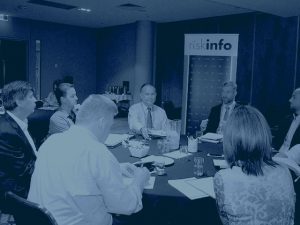Are you doing your client a favour by being their adviser, or is your client doing you a favour in having you as their adviser? Chris Unwin has a firm view on this question, and in his second pearl of wisdom, Chris reflects on exactly how advisers add value for their clients – especially risk-focussed advisers…
Who’s Doing Who The Favour?

How often do financial advisers (especially newer ones) think that someone is doing them a favour by becoming a client? It is this very mindset that puts advisers on the back foot from the very start of a client engagement process.
I know that, when I first started in the business, I thought someone who did business with me was doing me a favour as it was generating revenue for me and helping me achieve my targets and goals! But then in those early days I also wasn’t exactly selective about who I took on board as a client – it was called “the mirror test”:- “Here – breathe on this mirror and if it clouds over, you’re in!”
Over time I was able to become more selective about who I took on as clients and I gained a proper perspective of who was doing who the favour when someone became a client.
In this day and age, as we inexorably move away from a commission based remuneration model (even in the risk advice space) and towards a fee based remuneration model, our perception of who is doing who the favour becomes all the more important. Understanding, appreciating and communicating the value that we represent to our clients in all aspects of financial planning becomes absolutely crucial in creating the right mindset for transitioning to a fee for advice scenario, and the right mindset is what enables us to get on to the front foot with our clients from day one.
When you take on a new long term client as a financial planner, which of the two parties is going to be the biggest beneficiary financially over the full duration of your business relationship? It’s going to be your client, isn’t it? And by a country mile! So who’s doing who the favour when a new client comes on board?
Let’s put your perception of the value that you represent to your clients to one more test:-
Question:- If an individual decides for whatever reason not to become a client of yours, what impact will that person’s decision not to become your client have on your financial goals?
Answer:- No impact whatsoever – plenty more where they came from!
Question:- What impact will that same person’s decision not to become a client have on their financial goals?
Answer:- Huge! – in fact in all probability they will not achieve their financial goals without your help.
If you do not believe these answers to be true, then you will have a problem getting on to the front foot and justifying a fee to your clients. After all, who’s doing who the favour?!
Communicating Your Value

The current changes to risk adviser remuneration models remind me somewhat of the introduction of commission disclosure back in the 90s, which meant that for the first time risk advisers had to disclose the amount of commission they were being paid for the cover they were recommending. An awful lot of seasoned advisers threw their hands in the air and exclaimed: “I don’t want to tell my clients how much I earn!”, and I would say “Don’t, then”, and they would say “But I have to now by law”, and I would say “No you don’t have to tell your clients how much you earn – tell them how little you earn!” If you think you’re being overpaid for the value that you represent to your clients, then you should probably get out of the business.
Realistically moving forward, most risk advisers will be looking at embracing a remuneration model that combines commission and fees, but I find that a lot of advisers are struggling with the concept of incorporating fees in to their remuneration – which of course is totally understandable having operated purely on commission for such a long time.
Having engaged with many advisers on this topic over the past couple of years, I believe that the large majority of the problems in this area are in your head, not the client’s. You are already delivering huge amounts of value to your clients, therefore any changes needed will typically be changes to your mindset rather than to your process.
When the concept of value reared its head in the risk advice space a few years ago, I think a lot of advisers grabbed a piece of paper and started to draw up a list of boxes that had to be ticked in order to be seen to be giving value. But here’s the thing:- value is not something that is specified – it is something that is perceived. It is an awareness on the part of the client and it stems from the client enjoying a quality experience rather than simply experiencing a transaction.
Moving forward I believe paying for quality advice and service will be an expectation of quality clients – therefore, the key will be to get off the back foot and on to the front foot as early in the engagement process as possible. What better time to preposition your fees than at the FSG stage of the process? Off the back of outlining the range of services you can offer your client over time, you have a perfect opportunity to start talking about which fee structure will be appropriate for this particular client rather than whether any fee at all will be payable.

Chris Unwin is a financial adviser of 37 years standing and has been a specialist risk adviser for the last 22 years. His training and consulting business has operated for 12 years and it specialises in helping advisers across the full spectrum of experience with their client engagement skills, both in the risk advice specific space as well as in the more generic soft skills space.
…And if anyone would like to receive Chris Unwin’s Chrisisms on a fortnightly basis, just email him with your details, including the state in which you reside.
Contact or follow the author: Telephone: +61 417 281 034 | Website | Email | LinkedIn











